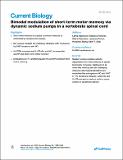Bimodal modulation of short-term motor memory via dynamic sodium pumps in a vertebrate spinal cord
Abstract
Dynamic neuronal Na+/K+ pumps normally only respond to intense action potential firing owing to their low affinity for intracellular Na+. Recruitment of these Na+ pumps produces a post-activity ultraslow afterhyperpolarization (usAHP) up to ∼10 mV in amplitude and ∼60 s in duration, which influences neuronal properties and future network output. In spinal motor networks, the usAHP underlies short-term motor memory (STMM), reducing the intensity and duration of locomotor network output in a manner dependent on the interval between locomotor bouts. In contrast to tonically active Na+ pumps that help set and maintain the resting membrane potential, dynamic Na+ pumps are selectively antagonized by low concentrations of ouabain, which, we show, blocks both the usAHP and STMM. We examined whether dynamic Na+ pumps and STMM can be influenced by neuromodulators, focusing on 5-HT and nitric oxide. Bath-applied 5-HT alone had no significant effect on the usAHP or STMM. However, this is due to the simultaneous activation of two distinct 5-HT receptor subtypes (5-HT7 and 5-HT2a) that have opposing facilitatory and suppressive influences, respectively, on these two features of the locomotor system. Nitric oxide modulation exerts a potent inhibitory effect that can completely block the usAHP and erase STMM. Using selective blockers of 5-HT7 and 5-HT2a receptors and a nitric oxide scavenger, PTIO, we further provide evidence that the two modulators constitute an endogenous control system that determines how the spinal network self-regulates the intensity of locomotor output in light of recent past experience.
Citation
Hachoumi , L , Rensner , R , Richmond , C , Picton , L , Zhang , H & Sillar , K T 2022 , ' Bimodal modulation of short-term motor memory via dynamic sodium pumps in a vertebrate spinal cord ' , Current Biology , vol. 32 , no. 5 , pp. 1038-1048.e2 . https://doi.org/10.1016/j.cub.2022.01.012
Publication
Current Biology
Status
Peer reviewed
ISSN
0960-9822Type
Journal article
Description
Authors are grateful for the financial support of this research by the University of St Andrews, the E&RS Neuroscience research fund and BBSRC grant BB/T015705/1.Collections
Items in the St Andrews Research Repository are protected by copyright, with all rights reserved, unless otherwise indicated.

